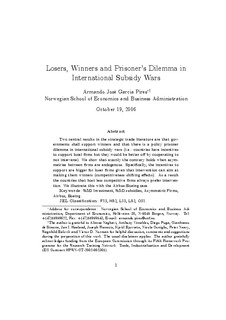| dc.contributor.author | Pires, Armando José Garcia | |
| dc.date.accessioned | 2007-02-21T08:37:01Z | |
| dc.date.available | 2007-02-21T08:37:01Z | |
| dc.date.issued | 2006-10 | |
| dc.identifier.issn | 0804-6824 | |
| dc.identifier.uri | http://hdl.handle.net/11250/163076 | |
| dc.description.abstract | Two central results in the strategic trade literature are that governments shall support winners and that there is a policy prisoner dilemma in international subsidy wars (i.e.: countries have incentives to support local firms but they would be better off by cooperating to not intervene). We show that exactly the contrary holds when asymmetries between firms are endogenous. Specifically, the incentives to support are bigger for loser firms given that intervention can aim at making them winners (competitiveness shifting effects). As a result the countries that host less competitive firms always prefer intervention. We illustrate this with the Airbus-Boeing case. | en |
| dc.language.iso | eng | en |
| dc.publisher | Norwegian School of Economics and Business Administration. Department of Economics | en |
| dc.relation.ispartofseries | Discussion paper | en |
| dc.relation.ispartofseries | 2006:33 | en |
| dc.subject | R&D investment | en |
| dc.subject | R&D subsidies | en |
| dc.subject | airbus | en |
| dc.subject | boeing | en |
| dc.subject | asymmetric firms | en |
| dc.title | Losers, winners and prisoner's dilemma in international subsidy wars | en |
| dc.type | Working paper | en |
| dc.subject.nsi | VDP::Samfunnsvitenskap: 200::Økonomi: 210::Samfunnsøkonomi: 212 | en |
